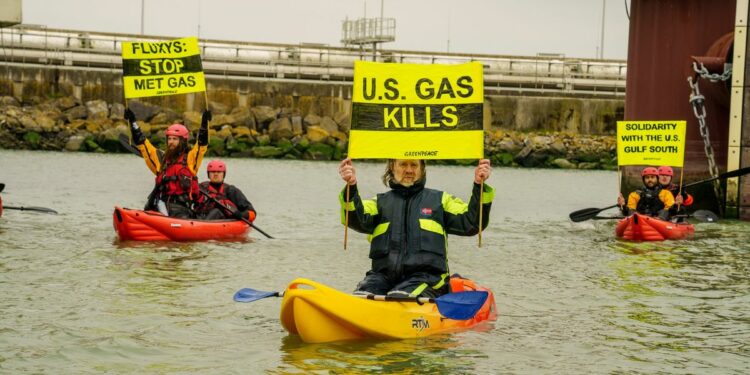More and more LNG export facilities—and E.U. import facilities for that matter—will become stranded assets, and the money invested in them, which should have been invested in renewable energy and energy efficiency, will be lost.
The U.S. Gulf Coast is not only hit by reckless fossil fuel industry activities, but also regularly hit by major hurricanes—and finds itself in the middle of an active hurricane season right now. Increasingly damaging hurricanes are only one of many consequences of the climate crisis. We all experience one heat record after another, floods, droughts, and the world has probably surpassed the 1.5°C threshold already. LNG is fossil methane and has a global warming potential over 100 times higher than that of carbon dioxide in the next crucial decade. LNG leaks methane all along the supply chain.
This should be shocking for any European—and American—to hear, given in the past two years, Europe swallowed
over 60% of all LNG that the U.S. exported. After Europe has been scrambling to get off Russian gas, U.S. LNG made up for over 46% of the gas in the E.U. in 2023, and almost all of it is fracked—making the LNG’s climate impact even worse.
Now there are gigantic further LNG plans in the making: Massive LNG export capacity increases are planned in the Gulf Coast. But even notwithstanding the fact that people and the planet can’t afford even more LNG, this buildout does not make sense: The E.U.’s gas demand has already decreased by 20%, and will decrease further if we take our climate commitments seriously. Austria’s fossil gas demand has decreased by 25% since the Russian invasion of Ukraine. However, we are still heavily dependent on Russian gas. In March of 2024, 93% of our gas imports came from Russia—and this too is a shocking truth. So while we may need LNG from other countries in the short-term in order to diversify our gas imports, we would be putting ourselves between a rock and a hard place if we were to replace Russian gas with fracked LNG from the U.S. and Canada. There is no lesser of two evils. This is exactly why it is so important that we phase out fossil gas and transition to sustainable alternatives in those industries that will still depend on gas in the future.
But there is no doubt about our long-term trajectory. We agreed to achieve climate neutrality by 2040. This will be the end date for any use of fossil gas in Austria. The European Union aims for climate neutrality 10 years later than we do. In any case, the bottom line is that we will be phasing out the use of fossil gas in the next 25 years in Europe—which should not be ignored by our transatlantic partners. If we all take our international commitments seriously—commitments that were strengthened at the last climate conference in Dubai—we must not invest in the long-term expansion of ever more LNG capacity. There is no alternative to a fossil fuel phaseout.
In addition to that, more than 40% of the E.U.’s LNG import capacity has been idle last year and the bloc’s LNG demand is expected to
peak very soon—possibly already this winter. More and more LNG export facilities—and E.U. import facilities for that matter—will become stranded assets, and the money invested in them, which should have been invested in renewable energy and energy efficiency, will be lost.
Rather than channeling support into fossil giants like LNG export plants—fuming, polluting, and venting sometimes more than 90 hours straight—we need a transatlantic strategy to get off fossil fuels, as fast and fairly as possible.
Source link : https://www.commondreams.org/opinion/lng-us-europe
Author :
Publish date : 2024-09-26 12:39:09
Copyright for syndicated content belongs to the linked Source.



